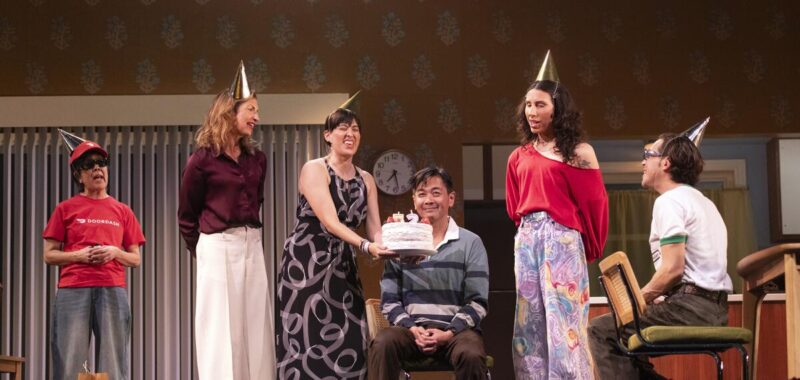Every age sees the apocalypse in its own image, as the distinguished literary critic Frank Kermode observed in his book “The Sense of an Ending.” The apocalyptic imagination, he argued, imposes on history “neat, naïve patterns” presaging a turning point in the grand scheme of humanity.
One sign of the fictional nature of this line of thinking is the way prophecies of the end of the world are routinely, in Kermode’s words, “disconfirmed without being discredited.” Apocalypse, in short, has a way of making believers of us all.
I remind myself of this sage corrective, because like playwright Keiko Green, author of the new comedy “You Are Cordially Invited to the End of the World!” I too have a sense that the end is near.
Science seems to back up our fears. The Earth itself is endangered. Species are dying off, sea levels are rising and extreme weather events are occurring more frequently.
Greg (Joel de la Fuente), the terminally ill central character of “Cordially,” has become obsessed with the ravages of human-induced climate change since his diagnosis of Stage 4 pancreatic cancer. As his body fails him, he sympathizes more deeply with the dying planet, going so far as to declare to his bewildered loved ones that he is the Earth itself.
“Cordially,” which is having its world premiere at South Coast Repertory under the direction of Zi Alikhan, may sound grim, but it’s surprisingly bouncy. M (River Gallo), Greg’s adult child who is an emerging drag performer, serves as emcee for this story about love, grief and finding meaning in the face of extinction.
The play has elements of Thornton Wilder’s “Our Town” and “The Skin of Our Teeth” and echoes of contemporary plays, such as Julia Cho’s “Aubergine” and Eboni Booth’s “Primary Trust.” Additionally, the movement from domestic mayhem to cosmic absurdity evokes the works of Paula Vogel and Sarah Ruhl, American exemplars of magic realism.
In their different ways these writers set the isolated suffering of individuals against a twinkling night sky of existential mystery. Green, an L.A-based playwright on the rise, may seem to be inventing her own rules for theatrical storytelling, but she is simultaneously working in a rich theatrical tradition.
It takes a bit of time for “Cordially” to find its rhythm. Scenically, the production is limber if not especially visually inviting. But the bigger challenge is that Green is enfolding stories within stories that have an associative yet indirect connection.
The play is about the end of the word, we’re told by M at the beginning. But then we move to the doctor’s office, where Greg and his wife, Viv (Alysia Reiner), receive some dire medical news.
Viv reacts badly to how the doctor (Sharon Omi) is discussing Greg’s illness. But her own bedside manner leaves something to be desired. Green doesn’t worry whether her characters come off as likable or not. In a crisis, unpleasant behavior can be excused. But everyone is going through something difficult in “Cordially,” and the lack of, well, cordiality can be wearying.
M, who uses they/them pronouns, is dour and defensive in their interactions with their parents. Greg and Viv strive to be accepting, but Greg keeps accidentally referring to M as Michael. He apologizes for his mistake, but M’s frustration suggests a complicated history that the play doesn’t have time to delve into.
Viv takes part in a counseling group but resents having to share her story about her husband’s illness when pressed to do so by another member, Janet (Omi, making a lasting impression in a small role). Lila (Anna LaMadrid), Viv’s sister, is more amiable, but in such a woo-woo manner that she creates tensions of a different kind.
As for Greg, he would seem to be the obvious repository for the audience’s sympathy. But he’s in such manic distress over the climate crisis that he’s acting crazier than anyone around him. Or should I say saner? He certainly has reason to feel that the Earth is on fire. But when he starts hallucinating conversations with climate activist Greta Thunberg, imagining himself at a support group for extinct animals and actually vandalizing borrowed lawnmowers, it seems his chemo is upending his brain.
The play comes into sharper focus when Will (a vibrant Rafael Goldstein), M’s boyfriend, challenges Greg’s belief that individuals must do what they can to stop climate change. Will, who works for an environmental nonprofit, argues that humans won’t be able to recycle their way out of the crisis and that harping on personal responsibility only lets corporate perpetrators off the hook.
The clash of perspective enlivens the drama by clarifying the thematic questioning holding “Cordially” together — how can human beings process the scale of destruction around them without succumbing to feelings of futility. Our lives may be going extinct — some, like Greg’s, sooner than others — but that doesn’t mean they don’t matter or can’t at the very least make a small difference, one recycled can or compassionate gesture at a time.
M, moving through different stages of grief, treats the apocalypse as an occasion to party like it’s 1999 — or whatever year the end of the world is now scheduled. In full drag regalia, they unflinchingly confront the encroaching darkness with a theatrical exuberance that says, “I’m here, my eyes are open and I care.”
The show ends with an audience ritual, asking theatergoers to speak the names of lost loved ones. “Cordially” is a little too jumpy for its own good, but its discursive heart is in the right place for these grievous times.

